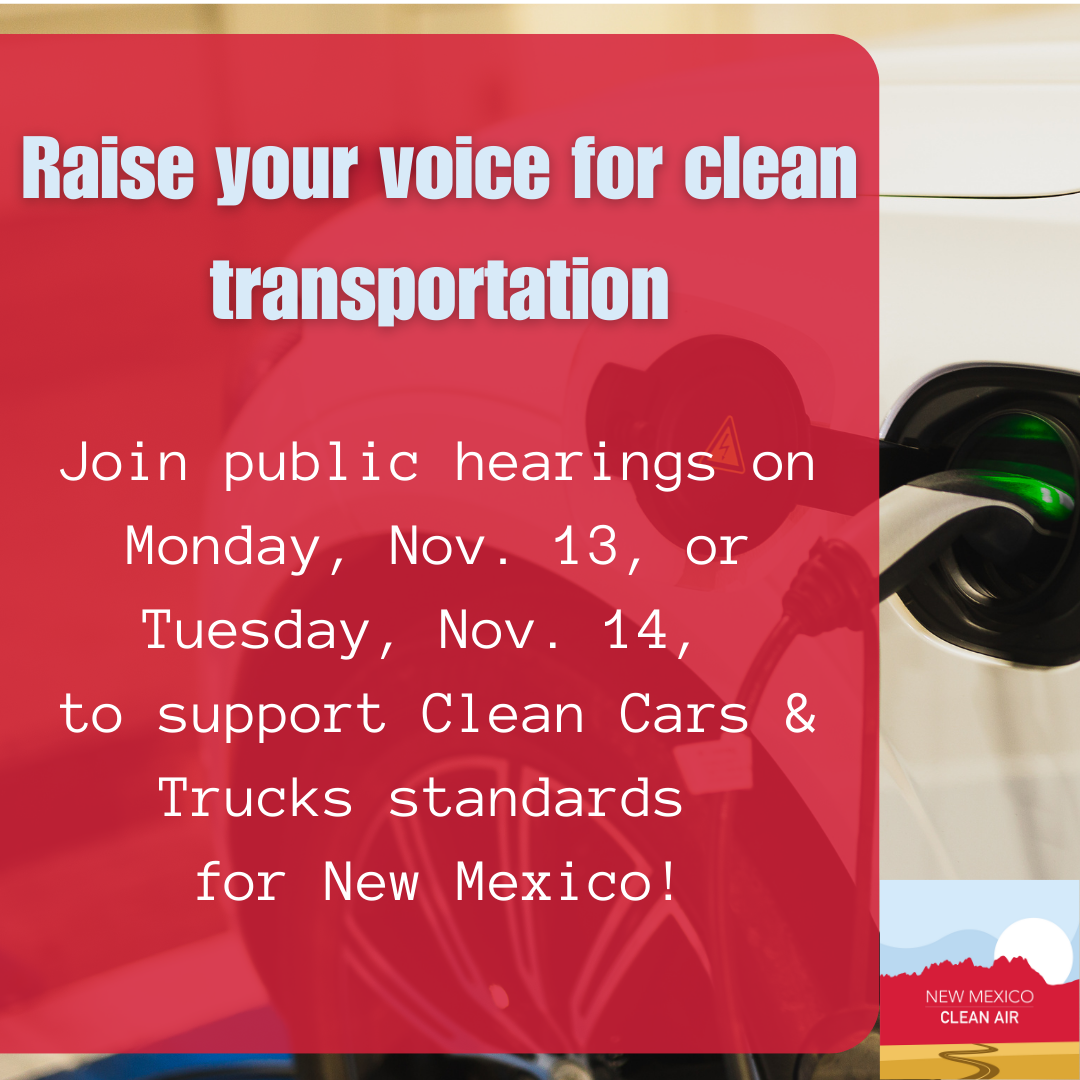Air quality boards concluded extensive public hearings by adopting standards bringing clean vehicles, jobs, health, economic, and climate benefits to New Mexico
FOR IMMEDIATE RELEASE
November 16, 2023
Media Contact: Liliana Castillo at 575-219-9619 or liliana@singlespacestrategies.com
ALBUQUERQUE, N.M. – A broad coalition of state climate, environmental justice, and business groups known as New Mexico Clean Air welcomed the New Mexico Environmental Improvement Board and the Albuquerque-Bernalillo County Air Quality Control Board adopting the Advanced Clean Cars II, Advanced Clean Trucks, and Heavy-Duty Low NOx standards at the conclusion of public hearings Nov. 13-16. These critical standards will improve air quality and boost jobs and the state’s economy as they accelerate a transition to clean transportation.
The Advanced Clean Cars II (ACCII) and Advanced Clean Trucks (ACT) standards, proposed by Gov. Michelle Lujan Grisham on July 3, will provide New Mexico drivers with many more zero-emission clean vehicles to buy. Together, the new clean vehicles standards will go into effect for model year 2027 cars and trucks arriving in showrooms. The clean vehicle standards will require 82% of new vehicles sold in the state by 2032 to be zero-emission.
Adopting these stronger clean cars and trucks standards is critical in addressing rising gas costs for families, combatting the climate crisis, and protecting public health. The measures will limit air pollution from vehicle tailpipes and require auto and truck manufacturers to deliver an increasing number of zero-emission electric vehicles, which includes plug-in hybrid and electric vehicles (EVs), for sale in the state. Electric vehicles and associated federal and state incentives will save consumers money over the vehicle’s life. ACCII applies only to new vehicle sales.
Advanced Clean Trucks establishes annual zero-emission truck sale requirements that vary by vehicle type and increase over time. The Heavy-Duty Low NOx Omnibus will significantly reduce smog-forming pollution from new diesel-fueled trucks by strengthening the standards for nitrogen oxides and particulates.
The state adopted the Advanced Clean Car II standard through model year 2032. According to an analysis by ERM, they will cut nitrogen oxides, particulate matter, and greenhouse emissions by 80% by 2050. As a result, the standards will help prevent 73 premature deaths, 68 hospital visits, and 41,300 minor health complications.
According to ERM’s analysis, adopting the Advanced Clean Trucks and complementary regulations, called the Heavy-Duty Low NOx standards, will deliver more than $3.3 billion in total benefits between 2020 and 2050. That includes about $600 million in health benefits, including 51 avoided premature deaths and 28,065 avoided respiratory illnesses. Annual greenhouse gas emissions from New Mexico’s heavy-duty fleet will fall 39% by 2050.
The Low NOx standards require manufacturers to cut the emissions of diesel trucks by 90% by 2027, update engine testing and durability, and extend engine warranties to ensure that harmful emissions are regulated in the vehicles being sold in the state.
Air pollution from cars and trucks is the second-largest source of climate pollution in New Mexico, harming health, environment, and climate. Transportation pollution is a public health crisis in New Mexico, disproportionately impacting lower-income communities, communities of color, children, elders, and anyone with respiratory conditions like asthma. Zero-emission cars and trucks are the fastest way to curb the transportation sector’s toxic air pollution and greenhouse gas emissions.
“These rules will save New Mexico residents and businesses billions of dollars while dramatically cutting pollution,” said Travis Madsen, Transportation Program Director at the Southwest Energy Efficiency Project. “With this vote, New Mexico has secured a position as a leader in clean, efficient transportation. Thank you to Governor Lujan Grisham for proposing these important rules, to the state and city staff who worked hard to draft the policy, and to the Board Members and Commissioners who voted to charge ahead.”
“I am grateful Governor Lujan Grisham and Albuquerque Mayor Keller have adopted common-sense ready-made policies to accelerate zero-emission vehicle deployment in New Mexico to improve our health, protect our climate, and save us money: the Advanced Clean Cars and Trucks Standards. These standards guarantee that clean cars and trucks will come to New Mexico,” says Ona Porter, Clean Energy Leader and Founder Emerita at Prosperity Works.
“New Mexicans will be able to breathe easier, buy more clean, affordable vehicles, and help put the brakes on climate change with the adoption of Clean Cars and Trucks Standards. Updating sensible and achievable standards for cleaner cars and trucks would help address the climate crisis and improve public health by sharply cutting tailpipe emissions from new motor vehicles sold in the state while also saving New Mexicans money,” says Alexis Mena, New Mexico policy director at NRDC (Natural Resources Defense Council).
In the New Mexico rulemaking process, David R. Baake, Baake Law, LLC, and Charles de Saillan, New Mexico Environmental Law Center, provided legal representation for the Natural Resources Defense Council, Southwest Energy Efficiency Project, Coalition for Clean Affordable Energy, 350 New Mexico, Western Resource Advocates, Prosperity Works, Conservation Voters New Mexico, Sierra Club, New Mexico Interfaith Power and Light, Center for Civic Policy, Western Environmental Law Center, CALSTART, and 350 Santa Fe.
Following are statements from a few of the intervenors and coalition partners:
“Adopting the Advanced Clean Cars and Trucks Standards amid a once-in-a-lifetime influx of federal funding for clean vehicles from the Inflation Reduction Act means that now New Mexico will be able to make the most of federal dollars to support the deployment of clean cars and trucks, boosting the state’s economy and creating clean tech jobs. These standards will further secure an affordable and healthy clean transportation future while helping the state chip away at the root cause of increasing costs from climate-fueled weather disasters,” says Susan Nedell, Mountain West Advocate for E2 – Environmental Entrepreneurs.
“Studies show that adopting Clean Cars and Trucks Standards will save lives in New Mexico. The hundreds of commenters have told us EVs are fun and much less expensive to own than gas cars, but they’re hard to come by in New Mexico without standards like Clean Cars. New Mexico is addressing the climate emergency, accessing millions in federal investments to boost our infrastructure and making clean cars more accessible and affordable,” says Camilla Feibelman, Sierra Club Rio Grande Chapter director.
“It’s a good day for the future of New Mexico’s climate and air. The passage of the New Mexico Clean Car and Truck standards marks a massive step forward in the state’s efforts to address climate change and improve air quality. These standards will save drivers money at the gas pump, increase the availability of zero-emission vehicles for consumers to purchase, and promote equitable access to these vehicles for all New Mexicans. We applaud the Environmental Improvement Board and the Albuquerque Air Quality Control Board for adopting these critically important rules,” said Aaron Kressig, Transportation Electrification Manager for Western Resource Advocates.
“CALSTART applauds New Mexico’s leadership in adopting these market-transforming policies,” said Alissa Burger, Regional Policy Director for CALSTART. “By enacting the Advanced Clean Cars and Trucks Standards, New Mexico will cultivate a supportive ecosystem for zero-emission vehicle deployment while decarbonizing the state’s on-road transportation and substantially improving public health for New Mexicans.”
“We are pleased by today’s action on the Advanced Clean Cars and Trucks Standards. Because children are still growing and developing, they are more susceptible to the harmful impacts of air pollution – so these standards make sense not just for the health of our children today but for the health of their planet tomorrow,” said Bill Jordan, Interim Co-Director, New Mexico Voices for Children.
“Climate change is the largest ethical and moral concern of our time, and we are grateful and encouraged that important actions were taken to protect the health of New Mexico communities and all of creation by adopting the Advanced Clean Cars and Trucks Standards,” said Clara Sims, Assistant Executive Director, New Mexico & El Paso Region Interfaith Power and Light.
“This is an exciting time for New Mexico– including Tribal Nations and Pueblos to be part of the EV transition. It’s hope-filled. When I think of these rules being adopted, I picture an inter-tribal EV charging network in collaboration with state regulatory bodies and utilities. I see charging infrastructure wholly owned and managed by Tribes and Pueblos, providing additional revenue to these communities, workforce development, and tourism in rural areas. And it all starts with this early rulemaking decision. Again, this is an important step in creating more opportunities for state and Tribal Nations to collaborate as equal partners in clean energy challenges, or as I like to call them– opportunities.” said Catherine Zingg (Ho-Chunk Nation), Director of Indigenous Partnerships, Vote Solar.
“As health professionals in New Mexico, we are grateful that our state has taken a significant step towards reducing toxic pollution from cars and trucks. These standards are actually life-saving. By reducing harmful tailpipe emissions, the standards will help to alleviate the burden of diseases such as cancer, respiratory and cardiovascular diseases, and detrimental effects on pregnant women and children. This is an important climate solution that protects health and promotes equity for our state,” said Shelley Mann-Lev, Executive Director, New Mexico Health Professionals for Climate Action.
“New Mexico has enormous electrification potential. We’re excited to see this administration make real progress toward cutting one of our most significant sources of air pollution. Working in tandem with the Inflation Reduction Act, New Mexico’s Advanced Clean Cars and Trucks Standards will make life better for New Mexicans, full stop. With standards like these, the state is proving itself a leader in electric transportation,” said Erik Schlenker-Goodrich, Executive Director of the Western Environmental Law Center.
“Everyday New Mexicans will be able to breathe easier with the adoption of these much-needed clean cars and trucks standards. Transportation, including the oil and gas industry that fuels it, is the largest source of pollution in our state. We are grateful that the Environmental Improvement Board and the Albuquerque Bernalillo County Air Quality Control Board were able to see through the misinformation. We look forward to New Mexicans having increased access to electric vehicles that don’t pollute our air and are less costly to maintain,” said Sammi Kao, Conservation Voters New Mexico Climate & Energy Director.
Background:
New Mexico and Colorado have now adopted the clean cars rule through 2032. Eight states – California, Maryland, Vermont, Washington, Oregon, Massachusetts, Virginia, and New York— have already adopted more comprehensive Advanced Clean Car II rules, which require 100% of new cars sold to be zero-emission by 2035. Other states are currently considering adopting advanced clean car standards, including Maine, Delaware, New Jersey, Connecticut, Rhode Island, and Washington, DC.
Furthermore, these states now have adopted the Advanced Clean Truck and heavy-duty truck standards: New Mexico, California, Oregon, Washington, Massachusetts, Vermont, New York, New Jersey, and Colorado. Maryland is expected to adopt them soon.
In early 2019, Governor Lujan Grisham announced that New Mexico would join the U.S. Climate Alliance, a bipartisan coalition of 23 governors committed to reducing greenhouse gas emissions by at least 26 percent from 2005 levels by 2025 — a goal consistent with the Paris Agreement. The Governor also signed an executive order directing state agencies to develop a State Climate Strategy and identify policies to reach these greenhouse gas goals. Adopting the Clean Cars Standard was a pillar of that plan. In 2018, Albuquerque Mayor Keller signed the Climate Mayors pledge, committing the City to reduce GHG emissions and help meet the Paris Agreement’s goals. In 2022, the New Mexico Clean Air coalition of over 35 organizations supported the first Clean Cars Standards led by the State of New Mexico and the City of Albuquerque.
New Mexico Clean Air is a coalition advocating for standards to reduce smog pollution in the state from tailpipes harming New Mexicans’ health and our climate. The coalition says that full adoption of the Advanced Clean Cars II standard through 2035 will make it easier for all New Mexicans to replace their dirty, polluting cars with low or zero-emission electric vehicles and improve air quality in our most impacted neighborhoods. By increasing the number of electric buses, pickup trucks, delivery trucks, and semi-trucks on our roads, Advanced Clean Trucks standards will help transform the freight industry to benefit our communities, especially those most harmed by air pollution.
New Mexico Clean Air hopes the state can build on today’s significant progress, moving toward adopting the full Advanced Clean Car II standard through 2035 as soon as possible.
###
The New Mexico Clean Air coalition includes consumer groups, EV drivers, conservation, climate, social justice, environmental justice advocates, businesses and leaders, local governments and elected officials, health voices, frontline communities, and labor representatives. NewMexicoCleanAir.com






